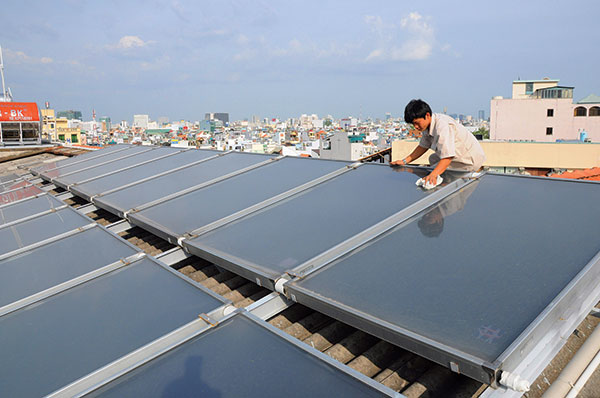Green growth sprouts from green investment

Banks can play a pioneering role in stimulating green growth Photo: Le Toan
After more than two decades of embracing economic reforms, Vietnam has now joined the group of medium income countries. The country has achieved many important United Nations Millennium Development Goals on poverty reduction and hunger eradication.
Such development, however, experts have argued, was for the most part rooted in the exploitation of natural resources and less-effective energy usage rather than an efficient economy and added value products and services; a situation that has had a harmful impact on the environment.
“The best way to save costs would be via more efficient resources and energy usage and reducing energy losses in production,” said Dr. Romel Carlos, programme manager, Sustainable Energy Finance at the World Bank Group’s International Finance Corporation (IFC) in Vietnam.
“However, the lack of financial sources and limited capacity of financial institutions hampers the implementation of sustainable energy projects. There are also limited or no awareness among local people and intermediary management levels about sustainable development,” he said.
These issues were acknowledged by deputy head of the Ministry of Natural Resources and Environment’s Vietnam Environment Administration Nguyen The Dong. “Vietnam’s economic growth was mainly based on quantitative rather than qualitative development, featuring high fuel and energy consumption in making products, thereby hurting the environment. Eco-friendly industries are largely underdeveloped. The current usage of natural resources is irrational and profligate, posing a real threat to the environment in a variety of areas,” he said.
Power consumption in Vietnam quadrupled in the past decade on the back of vigorous economic development and booming population growth. Critically, while energy demand spiked, energy usage has been ineffective and wasteful, proven through the fact that fuel consumption per product in Vietnam was 1.5 to 1.7 times higher than Thailand and Malaysia.
Escalating energy prices have driven up production costs and products and services have become costly which in turn undermined business efficiency, competitiveness and profit margins.
The IFC sees the important role of local financial institutions in spurring investments in energy efficiency in Vietnam. The practice in new emerging economies shows that financing efficient energy usage has been and will be a new promising business field for banks.
By enacting the Law on Energy Efficiency, the government of Vietnam recognised that improving energy efficiency will lead to better energy security and availability for the country and improved competitiveness of enterprises. The ever increasing energy costs, unstable and inadequate energy supply is resulting in Vietnam’s burgeoning demands for energy efficiency and cleaner production which should pave the way for the financial market to step in.
“In the Philippines, the investment portfolio for energy efficiency at the Bank of Philippine Islands jumped to $363 million in just two years,” said Dr. Carlos.
Considering the current economic turmoil, banks pioneering strategies and rolling out products to finance energy efficiency will gain an advantage as innovative, and be considered as contributing positively to the sustainable development of the country
“Through funding energy efficient projects for small and medium-sized enterprises, banks can both help businesses sharpen competitiveness and boost profits and develop their customer portfolio and increase market share,” the IFC underscored.
What the stars mean:
★ Poor ★ ★ Promising ★★★ Good ★★★★ Very good ★★★★★ Exceptional
Latest News
More News
- Going green to save a bundle (June 08, 2015 | 10:00)
- Green buildings: the rising trend (June 02, 2015 | 09:41)
- Green buildings – key to sustainable urban development in Vietnam (May 18, 2015 | 17:00)
- Feed-in tariffs continue to haunt green energy prospects (December 15, 2014 | 10:47)
- Building material types intrinsic to green ratings (December 09, 2014 | 11:56)
- Turning an eco- smart dream into reality (December 09, 2014 | 11:55)
- Green products enjoy a growing presence at Vietbuild Hanoi 2014 (December 01, 2014 | 10:06)
- Country profits from green building (November 24, 2014 | 11:02)
- Firms flout enviroment laws (November 17, 2014 | 10:48)
- Energy efficient sticks and carrots (November 10, 2014 | 15:30)
















 Mobile Version
Mobile Version